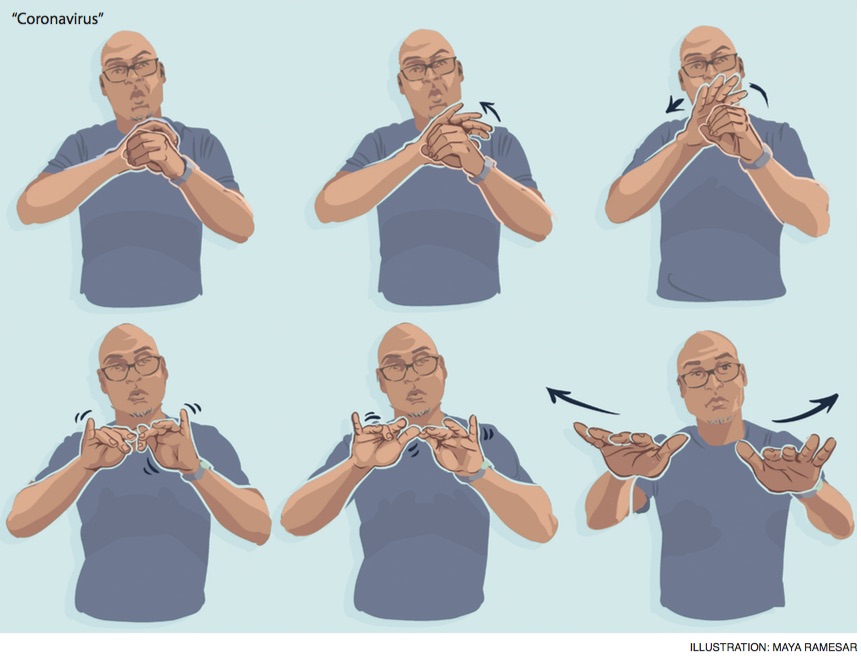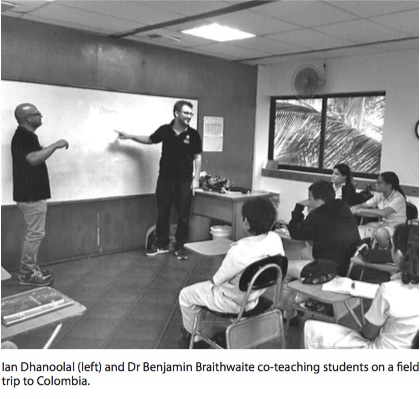Access to public broadcast updates about COVID-19 has become critical for Trinidad and Tobago. Imagine having to rely on a poor quality broadcast given in a completely different language to figure out what’s going on during a global pandemic. This is what receiving communication during a crisis is like for the Deaf community.
You might remember seeing sign language interpreters on TV or your mobile device during the daily news and press conferences. They are usually present in a little box in a corner of the screen. Tutors and sign language interpreters from the UWI Caribbean Sign Language and Interpreting (CLSI) programme in the Department of Modern Languages and Linguistics (DMLL) share their thoughts on why this is a disservice to deaf people and why the Deaf community have been stepping up to help fill in the communication gaps.

Sign language interpreter Joel Jaggernauth, who is a child of deaf adults, wrote about his frustrations with the current broadcast format in a Facebook post that had 113 shares: “The WDF [World Federation of the Deaf] states that the interpreter must cover at least 25 per cent of the screen. As you can see, (for) both Jamaica and Grenada the interpreter is CLEARLY VISIBLE and is taking up 50 per cent of the screen, whereas in Trinidad it’s such a joke.... Sign language interpreters are risking their lives for the Deaf community in this very critical time only to be represented like this? This is ridiculous!”
Tiny boxes are just one of the reasons the deaf in this country are not getting access to important public information about COVID-19. Coordinator of CLSI and UWI Lecturer Dr Benjamin Braithwaite explains that “There’s lots of language variation in Trinidad and Tobago: some people use American Sign Language [ASL], others prefer Trinidad and Tobago Sign Language [(TTSL]. Trying to provide a live interpretation which is accessible to everyone, especially given the length of the press conferences, is extremely difficult, sometimes an impossible task.”
When it comes to providing the deaf with vital information, the consensus among the group is that it’s best to let the deaf speak for themselves. Someone who knows this first-hand is Ian Dhanoolal. He is Vice President for the Trinidad and Tobago Association for the Hearing Impaired, President of the Deaf Empowerment and Advancement Foundation, UWI sign language and interpreting tutor for more than 10 years, and a member of the deaf community. He is also the recipient of the Laurent Clerc Cultural Fund (LCCF) Edward Miner Gallaudet Award in 2019 for his research over more than a decade and for promoting the well-being of the Deaf throughout the Caribbean.
A lot gets lost in translation when broadcast channels use hearing interpreters instead of deaf interpreters, Dhanoolal says. “Hearing people often underestimate the importance of the face in sign languages. Think of it like intonation. Without the appropriate facial movements, the message can be lost. Hearing interpreters have a tendency to place signs in the order they would come in an English sentence, but this is not the way a deaf person would sign. Sign languages have their own grammatical rules and different word orders. For example: ‘What is your name?’ A deaf person would sign, ‘Your name is what?’”
If public broadcast announcements are not a good option, then one would think written messages in newspapers and social media would surely suffice. Unfortunately, the default assumption that deaf people easily comprehend their country’s written languages is inaccurate. Dhanoolal and Braithwaite stress that deaf education in the Caribbean has been failing the hearing impaired. The Deaf here are multilingual learners. They learn TTSL, ASL, Creole and English. They do not get access to spoken English outside of school, and there are longstanding challenges in Deaf education which mean that very few pass CXC English exams.
CLSI classes here at UWI St Augustine stress the importance of meeting deaf people where they are. Students from different disciplines learn sign language, not just in the classroom, but by building real relationships and exchanges between the Deaf and hearing communities. They go out and attend meetings, parties, and sporting events of the Deaf; and the Deaf community welcomes their willingness to learn. In these classes, learning sign language is more than just picking a new vocabulary, it is learning the language of persons who are often forgotten.

The need to learn more about Caribbean sign languages informs the research done in the Linguistics department. Not enough is known about the structure of sign languages such as TTSL. In 2018, as part of their research project, Dr Braithwaite and Ian Dhanoolal took 12 students on a class field trip to Guyana to learn and document an indigenous Carib sign language spoken by the people there. The ultimate aim is to change the curricula and policy in the education system so children can learn in the indigenous sign language, building on what they already know to support their development, rather than trying to teach in a language they do not know.
He notes that, in places where the Deaf successfully receive the information and access they need, they put sign language first. The organisation that has been doing that and providing the deaf community with COVID-19 updates is the Deaf Empowerment and Advancement Foundation, an NGO where deaf and hearing volunteers make videos in sign language exclusively for the deaf. They discuss and summarise press briefings and translate the information using video and illustrations. They make adjustments for their audience while being guided by international standards on some of the newer vocabulary associated with the global pandemic.
COVID-19 has made clear the challenges that the Deaf face every day. It is our turn to listen and advocate for change when they need it the most.
Applications are open for the Undergraduate Diploma in Caribbean Sign Language and Interpreting. For more information, please email benjamin.braithwaite@sta.uwi.edu or visit the Department of Modern Languages and Linguistics website: https:// sta.uwi.edu/fhe/dmll/CSLI.asp.